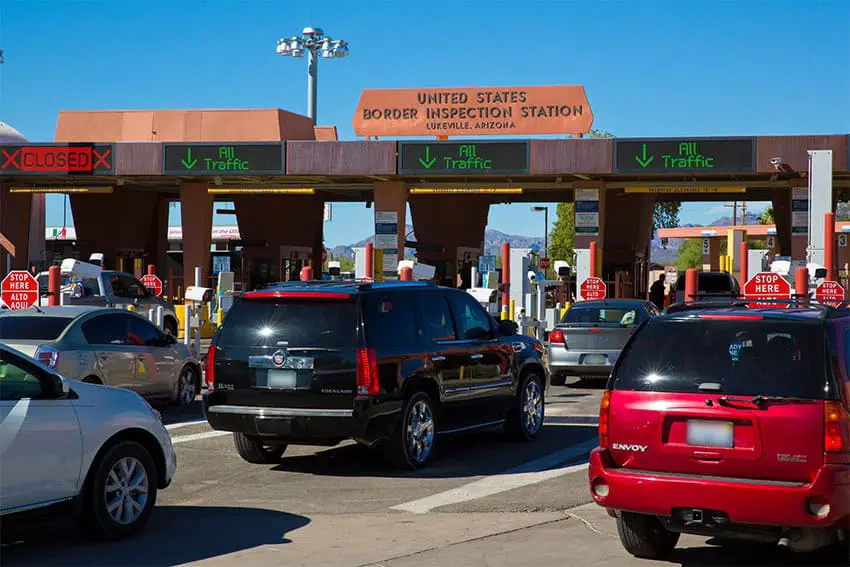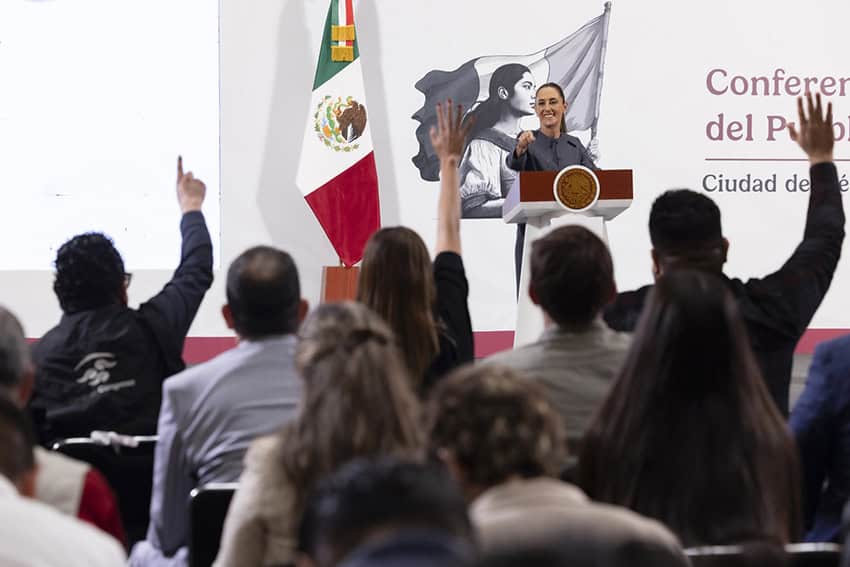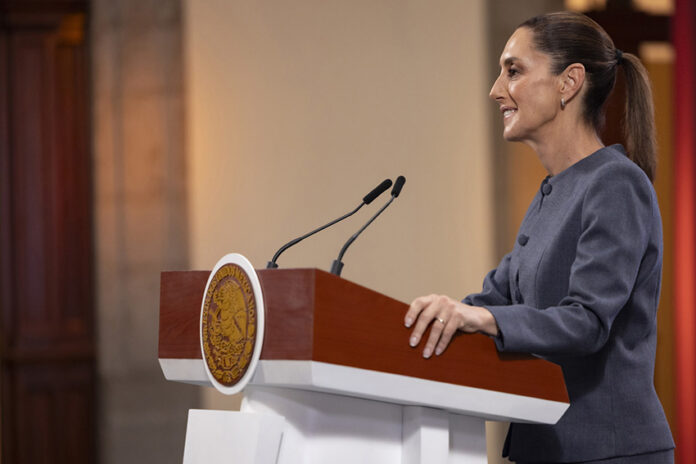At her Friday morning press conference, President Claudia Sheinbaum responded to the United States Supreme Court’s ruling on Thursday against a Mexican government lawsuit, and fielded questions about Mexico’s anti-fentanyl-trafficking efforts and her relationship with U.S. President Donald Trump.
Here is a recap of the president’s June 6 mañanera.
Sheinbaum expresses disagreement with US Supreme Court decision on suit against gunmakers
A reporter asked the president about the United States Supreme Court’s decision to throw out Mexico’s US $10 billion lawsuit against gunmakers after all nine justices ruled that a 2005 law, the Protection of Lawful Commerce in Arms Act (PLCAA), shields the defendants from prosecution.
“The argument of the Supreme Court of the United States is that they find no link between the manufacture of weapons and the passage of weapons from the United States to Mexico,” Sheinbaum said.
“Remember that in January of this year the United States Department of Justice released a document in which it recognizes that 75% of weapons seized in Mexico come illegally from the United States,” she said.
“But the [Supreme] Court says there is no link between who makes [the firearms] and the weapons that come into Mexico, something that we don’t agree with,” Sheinbaum said.
US Supreme Court throws out Mexican lawsuit against gunmakers
Justice Elena Kagan said in the Supreme Court’s written opinion that “because Mexico’s complaint does not plausibly allege that the defendant gun manufacturers aided and abetted gun dealers’ unlawful sales of firearms to Mexican traffickers, PLCAA bars the lawsuit.”
Sheinbaum noted that the Mexican government has a separate lawsuit against gun stores in Arizona. That suit was filed in 2022, but still hasn’t been resolved. In the lawsuit, the Mexican government accused five gun stores in Tucson, Phoenix and Yuma of involvement in illegal arms trafficking to Mexico, where the majority of firearms used in high-impact crimes such as murder come from the United States.
Sheinbaum said that her government would continue to collaborate with the lawyers working on that case.
She also said that her administration would “continue working with the government of the United States” on stopping the southward flow of firearms.
“For the first time,” the United States government has “recognized the importance” of authorities in the U.S. taking action to “reduce the passage of arms from the U.S. to Mexico,” Sheinbaum said.
She noted that new U.S. Ambassador Ron Johnson took to social media on Thursday to post about U.S. efforts to combat arms trafficking to Mexico.
Under the leadership of @POTUS @realDonaldTrump, we work with President @ClaudiaShein and her team to stop southbound arms trafficking and dismantle networks fueling cartel violence. Together, we make our countries stronger and safer.
— Embajador Ronald Johnson (@USAmbMex) June 5, 2025
Johnson wrote on X that “Under the leadership of @POTUS @realDonaldTrump, we work with President @ClaudiaShein and her team to stop southbound arms trafficking and dismantle networks fueling cartel violence.”
“Together, we make our countries stronger and safer,” he added.
Sheinbaum said that in talks with the United States government, “we’re going to continue insisting … that it’s not just about not allowing the passage of drugs from Mexico to the United States, but also about not allowing the passage of weapons from the United States to Mexico.”
‘Are you doing enough to avoid a U.S. military intervention?’
A reporter from Australia’s public broadcaster ABC asked the president whether the Mexican government, with its efforts to stem the flow of fentanyl to the United States, is doing enough “to avoid a U.S. military intervention.”
After stating that “President Trump is unpredictable and … has a history of controversial comments against women,” the reporter also asked Sheinbaum how she handles her relationship with the U.S. president.
In response to the first question, Sheinbaum said that the quantity of fentanyl seized by U.S. authorities at the Mexico-United States border has declined around 40% since Trump began his second term.

Seizures of fentanyl at the border can be used as a rough proxy to estimate the amount of fentanyl being smuggled into the United States across the Mexico-U.S. border. A decline in confiscations of fentanyl at the border therefore indicates a decrease in the quantity of the drug entering the U.S.
Sheinbaum attributed the “very significant” decline in fentanyl seizures at the border to her government making fentanyl busts on “this side of the border” — including the largest bust in Mexican history last December.
“Do we do it to satisfy President Trump? No,” she said.
“We do it because we don’t want fentanyl to reach any young person in the United States, nor do we want fentanyl to reach young people in Mexico or anywhere in the world,” Sheinbaum said.
She also said that “we reject the presence of United States troops” in Mexico “because Mexico is a sovereign, independent country.”
Sheinbaum said last month that she had rejected an offer from Trump to send the U.S. Army into Mexico to combat drug cartels.

In response to the reporter’s second question, Sheinbaum said that she handles her relationship with Trump “with respect.”
“I’ve always said Mexico must be respected. And when we speak by telephone, … [we speak] in an amiable way, always amiable, but with clear principles and seeking agreements,” she said.
“There has been recognition from the United States government of the work Mexico does in various areas,” Sheinbaum added.
“What do we want? An agreement that allows the trade pact [the USMCA] to be respected,” she said, explaining that Mexico is particularly pushing for an exemption from the 50% U.S. tariff on steel and aluminum that took effect this week.
By Mexico News Daily chief staff writer Peter Davies (peter.davies@mexiconewsdaily.com)
